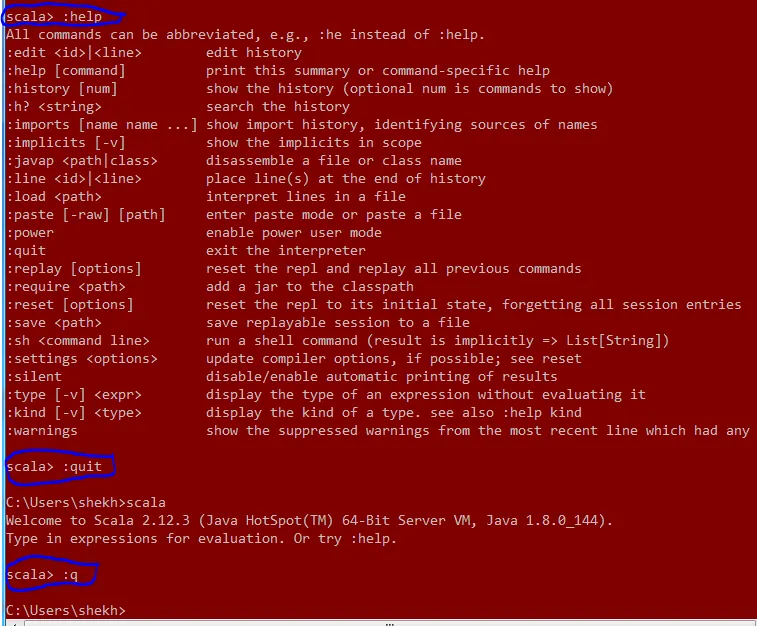我是Spark的新手,正在尝试弄清楚如何使用Spark shell。
查看了Spark网站的文档,但没有说明如何创建目录或在Spark shell中查看所有文件。如果有人能帮助我,我会非常感激。
我是Spark的新手,正在尝试弄清楚如何使用Spark shell。
查看了Spark网站的文档,但没有说明如何创建目录或在Spark shell中查看所有文件。如果有人能帮助我,我会非常感激。
:help获取可用命令列表。Welcome to
____ __
/ __/__ ___ _____/ /__
_\ \/ _ \/ _ `/ __/ '_/
/___/ .__/\_,_/_/ /_/\_\ version 2.3.0
/_/
Using Scala version 2.11.8 (OpenJDK 64-Bit Server VM, Java 1.8.0_151)
Type in expressions to have them evaluated.
Type :help for more information.
scala> :help
All commands can be abbreviated, e.g., :he instead of :help.
:edit <id>|<line> edit history
:help [command] print this summary or command-specific help
:history [num] show the history (optional num is commands to show)
:h? <string> search the history
:imports [name name ...] show import history, identifying sources of names
:implicits [-v] show the implicits in scope
:javap <path|class> disassemble a file or class name
:line <id>|<line> place line(s) at the end of history
:load <path> interpret lines in a file
:paste [-raw] [path] enter paste mode or paste a file
:power enable power user mode
:quit exit the interpreter
:replay [options] reset the repl and replay all previous commands
:require <path> add a jar to the classpath
:reset [options] reset the repl to its initial state, forgetting all session entries
:save <path> save replayable session to a file
:sh <command line> run a shell command (result is implicitly => List[String])
:settings <options> update compiler options, if possible; see reset
:silent disable/enable automatic printing of results
:type [-v] <expr> display the type of an expression without evaluating it
:kind [-v] <expr> display the kind of expression's type
:warnings show the suppressed warnings from the most recent line which had any
正如您在上面看到的那样,您可以使用:sh来调用 shell 命令。例如:
scala> :sh mkdir foobar
res0: scala.tools.nsc.interpreter.ProcessResult = `mkdir foobar` (0 lines, exit 0)
scala> :sh touch foobar/foo
res1: scala.tools.nsc.interpreter.ProcessResult = `touch foobar/foo` (0 lines, exit 0)
scala> :sh touch foobar/bar
res2: scala.tools.nsc.interpreter.ProcessResult = `touch foobar/bar` (0 lines, exit 0)
scala> :sh ls foobar
res3: scala.tools.nsc.interpreter.ProcessResult = `ls foobar` (2 lines, exit 0)
scala> res3.line foreach println
line lines
scala> res3.lines foreach println
bar
foo

:q或者:quit命令用于退出您的Scala REPL。
scala> :sh ls res5: scala.tools.nsc.interpreter.ProcessResult =ls(2 lines, exit 0)scala> res5 foreach println<console>:12: error: value foreach is not a member of scala.tools.nsc.interpreter.ProcessResultres5 foreach println- WoodChopperres5.lines foreach println。 - Ryan Hartmanres3 foreach println不起作用,应该改为res3.lines foreach println。 - Holger Brandl:sh cd /home/dean/bin/spark-2.3.0-bin-hadoop2.7 java.io.IOException: Cannot run program "cd": error=2, No such file or directory- Dean Schulze